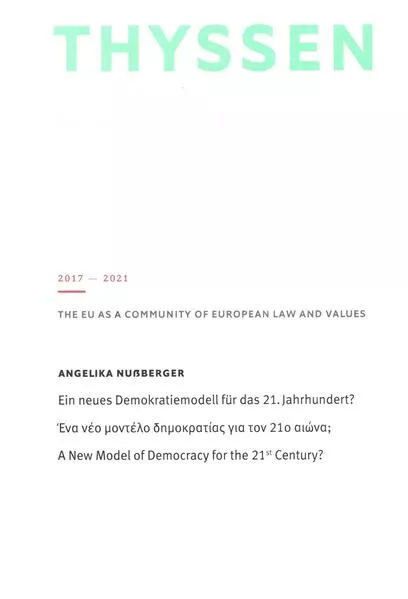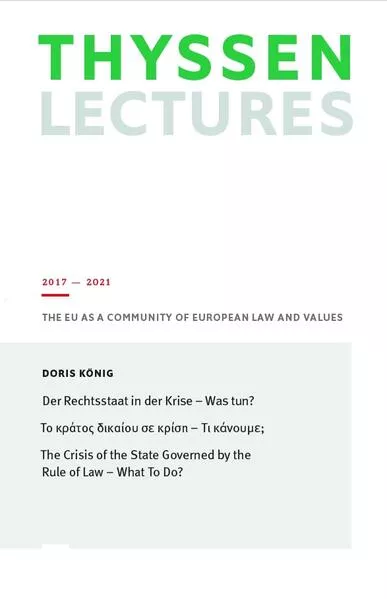Chronologie aller Bände (1 - 2)
Die Reihenfolge beginnt mit dem Buch "Ein neues Demokratiemodell für das 21. Jahrhundert?". Wer alle Bücher der Reihe nach lesen möchte, sollte mit diesem Band von Angelika Nußberger beginnen. Die Reihe umfasst derzeit 2 Bände. Der neueste Band trägt den Titel "Der Rechtsstaat in der Krise - Was tun?".
- Anzahl der Bewertungen für die gesamte Reihe: 0
- Ø Bewertung der Reihe: 0
Diese Reihenfolge enthält 2 unterschiedliche Autoren.
- Band: 5
- Autor: Nußberger, Angelika
- Anzahl Bewertungen: 0
- Ø Bewertung:
- Medium: Buch
- Veröffentlicht: 28.03.2023
- Genre: Politik
Ein neues Demokratiemodell für das 21. Jahrhundert?
With the "Thyssen Lectures" the Fritz Thyssen Foundation is continuing a tradition that is initiated beginning in Germany in 1979 and followed by venues at a series of universitites in the Czech Republic, Israel, the Russian Republic and, most recently, in Turkey.
The series in Greece is being organised for a period of four years under the leadership of Prof. Vassilios Skouris, former President of the European Court of Justice and current Director of the Centre of International and European Economic Law (CIELL), and is dedicated to the framework topic of "the EU as a community of European law and values".
A NEW MODEL OF DEMOCRACY FOR THE 21ST CENTURY?
Although the principle of democracy serves - at least de iure - as the foundation for the exercise of state power throughout the world, the threats being posed to democratic governance are apparent. This is not only the case with regard to the growing concentration of power in systems that are already chracterised as "authorian" like Russia, China and Turkey. But even consolidated democracies see themselves confronted with major challenges, however.
The internationalisation of decision-making, for example, while originally perceived as progress, is running up against mounting criticism as "undemocratic", while reservations exist when it comes to basing decision-making purely on expert knowledge, nor is it easy to counter populist tendencies. All this raises the question as to what extent new principles need to be elaborated for democratic governance in the 21st century.
The series in Greece is being organised for a period of four years under the leadership of Prof. Vassilios Skouris, former President of the European Court of Justice and current Director of the Centre of International and European Economic Law (CIELL), and is dedicated to the framework topic of "the EU as a community of European law and values".
A NEW MODEL OF DEMOCRACY FOR THE 21ST CENTURY?
Although the principle of democracy serves - at least de iure - as the foundation for the exercise of state power throughout the world, the threats being posed to democratic governance are apparent. This is not only the case with regard to the growing concentration of power in systems that are already chracterised as "authorian" like Russia, China and Turkey. But even consolidated democracies see themselves confronted with major challenges, however.
The internationalisation of decision-making, for example, while originally perceived as progress, is running up against mounting criticism as "undemocratic", while reservations exist when it comes to basing decision-making purely on expert knowledge, nor is it easy to counter populist tendencies. All this raises the question as to what extent new principles need to be elaborated for democratic governance in the 21st century.
- Band: 6
- Autor: Doris, König
- Anzahl Bewertungen: 0
- Ø Bewertung:
- Medium: Buch
- Veröffentlicht: 04.01.2024
- Genre: Politik
Der Rechtsstaat in der Krise - Was tun?
With the "Thyssen Lectures" the Fritz Thyssen Foundation is continuing a tradition that is initiated beginning in Germany in 1979 and followed by venues at a series of universitites in the Czech Republic, Israel, the Russian Republic and, most recently, in Turkey.
The series in Greece is being organised for a period of four years under the leadership of Prof. Vassilios Skouris, former President of the European Court of Justice and current Director of the Centre of International and European Economic Law (CIELL), and is dedicated to the framework topic of "the EU as a community of European law and values".
THE CRISIS OF THE STATE GOVERNED BY THE RULE OF LAW - WHAT TO DO?
In a liberal constitutional state, rule of law and democracy are two sides of the same coin. In a democracy as well, freedom requires state power to be constrained by law and action by the state to be subject to checks and controls by autonomous and impartial courts of law. In some EU Member States, the rule of law is being undermined, with governing elites citing the democratically legitimised rule of the majority as pretext. In the process, state institutions empowered with exercising checks and controls, such as courts of law, law enforcement agencies, police and intelligence services, are forced to tow the line, while key positions are filled with their own cronies. The EU has taken a number of steps to counteract this development. These include, in particular, case law handed down by the ECJ laying down requirements governing the independence of Member State courts. Although these measures are now having an impact, the crisis afflicting rule of law and democracy can ultimately only be resolved politically. Above all, the political will of the remaining Member States and a commitment on the part of their respective civil society are needed to preserve the EU as a community of law and values.
The series in Greece is being organised for a period of four years under the leadership of Prof. Vassilios Skouris, former President of the European Court of Justice and current Director of the Centre of International and European Economic Law (CIELL), and is dedicated to the framework topic of "the EU as a community of European law and values".
THE CRISIS OF THE STATE GOVERNED BY THE RULE OF LAW - WHAT TO DO?
In a liberal constitutional state, rule of law and democracy are two sides of the same coin. In a democracy as well, freedom requires state power to be constrained by law and action by the state to be subject to checks and controls by autonomous and impartial courts of law. In some EU Member States, the rule of law is being undermined, with governing elites citing the democratically legitimised rule of the majority as pretext. In the process, state institutions empowered with exercising checks and controls, such as courts of law, law enforcement agencies, police and intelligence services, are forced to tow the line, while key positions are filled with their own cronies. The EU has taken a number of steps to counteract this development. These include, in particular, case law handed down by the ECJ laying down requirements governing the independence of Member State courts. Although these measures are now having an impact, the crisis afflicting rule of law and democracy can ultimately only be resolved politically. Above all, the political will of the remaining Member States and a commitment on the part of their respective civil society are needed to preserve the EU as a community of law and values.

